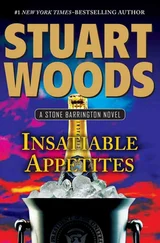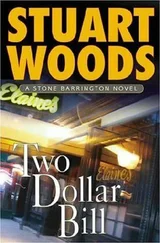“All right, tell me how I can get in touch with Ed Rawls.”
“Through me.”
“That is, apparently, a dead line.”
“Now you’re getting the picture, Lance, and it took such a long time.”
“Stone, one day soon you’re going to call me and ask me to do something for you.”
“What would I want you to do for me?”
“Oh, something — very likely something I shouldn’t do. Life is a two-way street, Stone.”
“That’s very pithy. Can I quote you?”
“You can tell Ed Rawls I said that.” Lance hung up.
Stone hung up and was immediately sorry he had let Lance do it first. Joan appeared in his doorway. “I’m afraid...”
Lance Cabot stepped from behind her. “Good morning again, Stone.”
“You were in your car all along, weren’t you?”
“I was. I didn’t want to be intrusive.”
“You mean like you’re doing now?”
“My more courteous efforts were rebuffed.” Lance made himself comfortable in the chair facing Stone.
“Have a seat, Lance,” Stone said. “Make yourself comfortable.”
“I renew my invitation to lunch,” Lance said. “We’ll go to that club where we both are members. Then we won’t have to fight over the check.”
Stone glanced at his watch. “I’m still not hungry.”
“You will be by the time we’re done here.”
“And what are we doing here?”
“Please pick up the phone and ask Ed Rawls to join us.”
“I’ve already told you...”
Lance held up a hand. “I don’t mind if he’s represented by counsel. This is not a legal proceeding, it’s just a friendly chat.”
“And where is the muscle?”
Lance laughed. “Those two paunchy timeservers? They’ve gone their own way. I’m glad we’re able to get together. I have some things to tell Ed, and it’s best if you hear them, too. Saves time.”
Stone picked up the phone and buzzed Ed.
“Yes?”
“Lance Cabot is in my office. I think it’s best to come down. Don’t worry, you won’t have to say anything, unless you want to.”
“Be right down,” Ed said, and hung up.
They sat quietly, trying not to stare at each other, until Ed walked into the office and sat down on the sofa across the room.
“Hello, Ed,” Lance said. “It’s been a very long time.”
“Copenhagen, wasn’t it?” Ed asked.
“In the Danny Kaye suite at the Hotel d’Angleterre, the one where the star stayed when they were filming Hans Christian Andersen .”
“I recall,” Ed said.
“Ed, you’ve been away from us for a long time, so I thought it might be a good idea if I reminded you of some old Agency practices and, perhaps, informed you of some newer ones.”
“I’m here to listen,” Ed said.
Stone gave him a thumbs-up by way of agreement.
“You will surely recall that the Agency requires its officers to submit any book or magazine material for approval before publication, even before showing such manuscripts to agents or publishers.”
“I have neither an agent nor a publisher,” Ed said.
“Only an attorney,” Stone said.
“And I am aware, Stone, that, with your wide acquaintance in New York, you are perfectly capable of representing Ed in his dealings with publishers.”
“Quite so,” Stone replied.
“Ed, our publishing policy has not changed. You may be aware that many manuscripts by former officers have been vetted and published.”
“Sure,” Ed said, “with a lot of black lines drawn through blocks of text.”
“What I hope is that, before you show a manuscript even to Stone, you will go through the text and draw those lines yourself.”
“You mean, you don’t want me to just blurt out everything I know about the Agency?”
“Certainly not, Ed, and you will know as well as anybody on our committee which passages require redacting.”
“I think what you mean, Lance, is that you don’t want even your committee to know what’s in the unexpurgated version.”
“That is so,” Lance said. “Information that is very sensitive has its way of spreading, and it spreads in proportion to the number of people who first possess it.”
“Perhaps there are things that present-day officers need to know about what their predecessors got up to.”
“We compartmentalize,” Lance said, “vertically as well as horizontally.”
“Every organization has a history,” Ed said. “What’s wrong with that?”
“We are not every organization,” Lance said firmly. “I think you are in a position to know that.”
“Oh, I know it very well, but I believe that a system, even a secret one — especially a secret one — needs to be periodically purged in order to retain its long-term health.”
“Even if so doing would damage people in high places who maintain friendly relations with the Agency?”
Ed shrugged.
“Even if the country is damaged by being deprived of the leadership of some of the best Americans alive?”
“Are you saying that these people should not be held accountable for their actions?”
“Certainly not. I believe the country is well served by knowing what their government has done — after sufficient time has passed for the damage to be put into perspective.”
“You mean, fifty years after those people are dead? What about the generations between now and then? Are they to remain ignorant of what was done on their behalf?”
“Lance,” Stone said, “can you be specific? Give us an example?”
“Why, of course, Stone. May I remind you, as an example, of two events that you are well acquainted with — when an outgoing President, on the morning of the inaugural day of his successor, in, quite literally, the final hours of his service, secretly pardoned two dangerous criminals, one who had assassinated high officials of our democracy, the other who was the most notorious traitor to this country since, perhaps, Benedict Arnold? How, if these things became known, would they affect the political longevity of his successor?”
“Will had very good reasons for his action, and we don’t know if Kate had any part in that,” Stone pointed out.
“Right on both points, but what does that matter?” Lance demanded. “Her political opposition would immediately assume, perhaps dishonestly, that she did, and so would many members of the public at large, and she would be pilloried. Can you, in good conscience, allow that to happen?”
“I am not in a position to make that judgment.”
Lance pointed a finger at Ed Rawls. “ He is! And you have taken it upon yourself to be his advisor.”
“That is not my role in this matter,” Stone said firmly. “I have been asked by a person I respect to keep all that from happening by securing... whatever is in that package.”
“And is it secure?” Lance asked. He pointed at Stone’s safe. “I know a dozen people who could unlock that in five minutes, and then it would be insecure.”
“I expect you do,” Stone replied. “Is that your plan?”
“And there is something else I haven’t mentioned,” Lance said, ignoring his question. “Even if what you have is destroyed, as Ed’s house was destroyed, there is still something I have heard about for years — the legendary memory of Ed Rawls, who, if he lives up to his reputation, could spew every fact in his head into a tape recorder, and then we would be back where we started.”
There was a long silence, during which no one wished to speak.
Then Ed Rawls said, “I think what Lance wants is to separate my head from the rest of my body.”
With that, Ed got up and walked out of the room. “You two have lunch,” he said over his shoulder. “I’ll order in.”
Читать дальше












